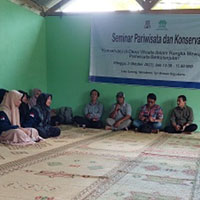Ficus sp. Lokal untuk Konservasi Air pada Kawasan Wisata Merapi di Desa Wisata Jaka Garong, Wonokerto, Turi, Sleman
DOI:
https://doi.org/10.14421/jbs.3973Keywords:
Ficus sp, konservasi air, wisataAbstract
Ficus sp telah lama dikenal oleh masyarakat sebagai pohon beringin, pohon ara, pohon kresek, pohon iprik; bahkan telah telah digunakan sebagai penamaan suatu wilayah dan terkadang disakralkan. Fakta tersebut serta potensi Ficus yang memiliki keunggulan cepat besar, penghasil oksigen, dan penyimpan air tanah dapat menjadi alternatif bagi konservasi air. Indonesia sebagai negara tropis juga tidak luput dari ancaman krisis air, memerlukan kesadaran bersama masyarakat untuk mencegahnya. Salah satu alternatif penyampaian kesadaran adalah dengan memberikan muatan edukasi tentang penghijauan khususnya menggunakan Ficus sp, pada kawasan wisata alam. Penelitian ini membahas upaya konservasi air pada Desa Wisata Jaka Garong yang terletak pada kawasan Merapi, dengan memanfaatkan Ficus sp.
[Ficus sp has long been known by the locals as beringin trees, ara trees, kresek trees, iprik trees; it has even been used as the naming of an area and is sometimes sacred. This fact and the potential of Ficus which has the advantage of growing quickly, producing oxygen, and storing groundwater can be an alternative for water conservation. Indonesia as a tropical country are also facing the threat of a water crisis, requiring public awareness to prevent it. One alternative to convey awareness is to provide educational content about reforestation, especially using Ficus sp, in natural landscape tourism areas. This study discusses water conservation efforts in the Jaka Garong Tourism Village which is located in the Mount Merapi area, by utilizing Ficus sp.]
References
Batoro J., Hakim L., dan Rahardi B., 2020, The perception of sacred trees as proponent of water spring in Malang Regency East Java, Indonesia, Asian J. Med. Biol. Res. 2020, 6 (3), pp. 425-430.
Khairunnisa H., Prasetyo J.S., Jehane P.T., Asyianita R.A., 2019, Kajian Pengembangan Wisata Edukasi Berbasis Konservasi Di Taman Hutan Raya K.G.P.A.A Mangkunegoro I Karanganyar, Jurnal Bio Educatio, Volume 4, Nomor 2, Oktober 2019 hlm. 25-34.
Nurhayati I., Al Kholif M., Shofwan M., Ratnawati R., 2018, Upaya Pelestarian Lingkungan Dengan Konsep Penghijauan Pada Lahan Kosong Desa Kalanganyar Kecamatan Sedati, Prosiding SNHRP 2018. Tema: (Inovasi, Teknologi dan Pendidikan Guna Mewujudkan Indonesia Sejahtera di Era Industrialisasi 4.0.
Prihanta W., Purwanti E., 2022, Restrukturisasi Kawasan Sumber Air Sebagai Wisata Edukasi di Desa Ngenep Kabupaten Malang, Jurnal Abdimas (Journal of Community Service): Sasambo. Mei 2022 Vol. 4, No. 2, pp. 203-217.
Masyarakat Ficus Indonesia, https://masficusid.wordpress.com, diakses pada 29 November, 2022 pukul 20.00.
Walton, K. In Java, the water is running out https://www.lowyinstitute.org/the-interpreter/in-java-water-is-running-out (accessed 2021 -06 -28).

Downloads
Published
Issue
Section
License
Copyright (c) 2023 Taufiq Aji, Sutriyono, Muhammad Farhan Qudratullah, Win Indra Gunawan

This work is licensed under a Creative Commons Attribution-NonCommercial-ShareAlike 4.0 International License.
Authors who publish with this journal agree to the following terms:
- Authors retain copyright and grant the journal right of first publication with the work simultaneously licensed under a Creative Commons Attribution-NonCommercial-ShareAlike 4.0 International (CC BY-NC-SA 4.0) that allows others to share the work with an acknowledgement of the work's authorship and initial publication in this journal.
- Authors are able to enter into separate, additional contractual arrangements for the non-exclusive distribution of the journal's published version of the work (e.g., post it to an institutional repository or publish it in a book), with an acknowledgement of its initial publication in this journal.
- Authors are permitted and encouraged to post their work online (e.g., in institutional repositories or on their website) prior to and during the submission process, as it can lead to productive exchanges, as well as earlier and greater citation of published work.





